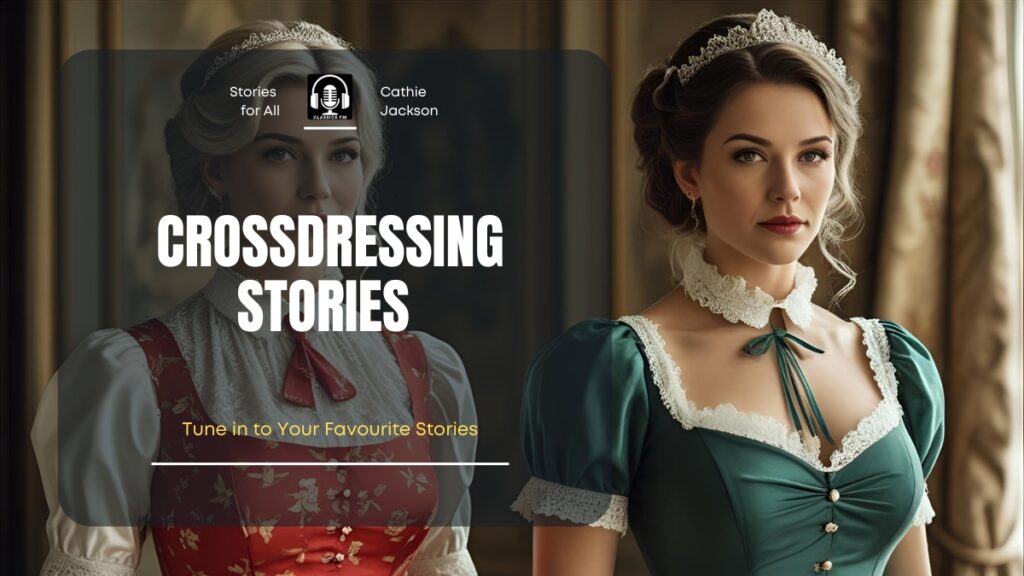Halloween’s weird, right? One minute you’re bobbing for apples, the next you’re flashlight-ready in the basement, sure you just heard something move. People have been swapping spooky tales for ages. It’s not just candy and pumpkins. It’s that small shiver that makes you equal parts scared and excited.
There’s a rush to it. Your heart picks up when the lights flicker on the page or a floorboard creaks while you’re reading alone. That feeling is why we hunt out Halloween stories to read. But not every story lands. Some are forgettable. Some haunt you for days.
So let’s figure out what makes a story worth staying up for. We’ll look for characters you care about, settings that pull you in, and slow builds that make the payoff sting. Stick with me and you’ll know which tales are worth the midnight read.
Why Humans Crave Halloween Stories
It’s primal, isn’t it? That little twinge of fear taps something deep inside us. When I was a kid, I’d lie under my blanket with a flashlight, reading tales of ghosts and monsters.
My older cousin thought it hilarious to sneak up on me mid-chapter, and I screamed so loud my neighbors probably called the cops once or twice. But here’s the kicker: I kept reading. I wanted it.
Psychologists say it’s all about controlled fear. Your brain knows you’re safe. Yet, it reacts like danger is real. My heart rate goes up. Adrenaline hits.
You get the thrill without the actual risk. It’s why we watch horror movies, go on haunted hayrides, or explore “haunted” houses that are just cardboard props and smoke machines.
A story? It’s the ultimate ride. Your imagination fills in gaps in ways that even the most cinematic effects can’t.
And let’s not forget nostalgia. There’s a certain comfort in returning to the classics. That worn copy of The Legend of Sleepy Hollow with scribbles in the margin. That tattered anthology you found at a garage sale.
Halloween stories don’t just scare—they remind you of the people you read them with, the houses you lived in, the autumn nights that smelled of firewood and caramel apples.
Halloween Stories to Read
Lights off, blanket up, and heart racing—these Halloween stories to read will keep you turning pages long after everyone else is asleep.
The Last Trick-or-Treater
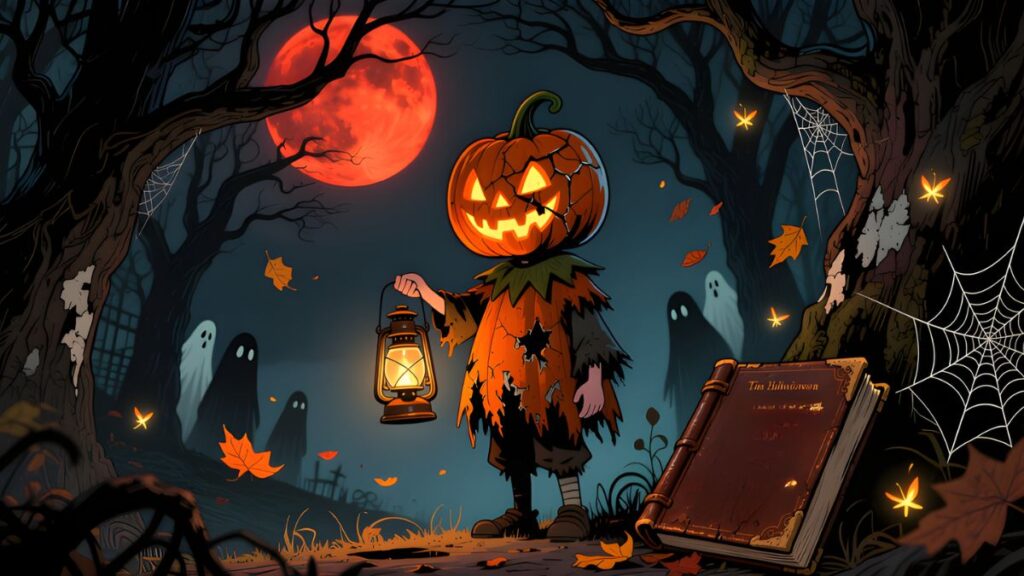
The town was quiet that Halloween morning.
Too quiet.
Mrs. Hawkins, who lived on the corner of Maple Street, was the first to notice. She opened her front door to find her lawn scattered with candy wrappers, untouched by anyone but her own. The neighborhood, normally alive with children darting from house to house, had been eerily still.
Only one house looked different.
The old Whitaker place at the end of the street. Its paint peeled in long strips, windows clouded with dust, and the gate hung crooked on its hinges. But unlike every other house, there were no wrappers, no signs of life… just the faint glow of candlelight inside.
Later that night, the first child appeared.
Tommy, eight years old, dressed as a vampire, crept down the sidewalk. He had a small pillowcase clutched in one hand, stuffed with the leftover candy he had collected from his own house.
“Trick or treat,” he said softly, pushing the creaking gate.
The door swung open before he could knock.
Inside, the Whitaker house smelled of old wood and decay. The furniture was coated in dust. Spiderwebs hung like curtains across the corners.
“Hello?” Tommy called.
No answer.
The air felt thick, as if it were pressing in on him. Still, he stepped inside.
He walked through the hallway, past portraits of somber faces with eyes that seemed almost… aware.
On a small table in the corner, a bowl of candy sat untouched. Bright wrappers gleamed under the flickering candlelight.
Tommy reached for it.
The moment his fingers touched the candy, it vanished. Just like that. Gone.
“Hey!” he shouted, pulling his hand back. He looked around. Empty room. No one.
Another piece disappeared.
Tommy stumbled back, his small heart thudding in panic. Then a faint giggle echoed from the staircase.
He froze.
“Wh-who’s there?”
No answer. Only the giggle. Higher up. Closer to the attic door.
Curiosity mingled with fear. Tommy climbed the staircase slowly, each step creaking under his weight.
The attic door was slightly ajar. He pushed it open.
A single shadow moved across the room.
“Hello?” he whispered.
A small figure stepped out of the darkness. A child. Pale, with hollow eyes that reflected the candlelight.
“Are you here for candy?” the child asked.
Tommy nodded, unable to speak.
The child smiled. Too wide. Too knowing.
Then it vanished.
The candy bowl rattled. Pieces jumped into the air and disappeared as if someone invisible was snatching them. Tommy ran down the stairs, tripping over his own feet, and burst out of the door into the night air.
He didn’t stop until he reached his own home, panting and trembling.
The next morning, the town was buzzing.
Every house had the same story. Candy untouched. Decorations pristine. No children roaming the streets.
Except for the Whitaker place.
Neighbors reported seeing a single child enter the house the previous night. None had seen them leave.
Tommy tried to tell his parents.
“They’ll probably just scare you, honey,” his mother said. “You had too much sugar.”
But he knew.
And the next Halloween, he wasn’t the only one to notice the Whitaker house.
Word spread. A dare. A challenge.
Some kids stayed away. Others were brave—or foolish.
Every Halloween, the same thing happened. One child would approach the Whitaker house. The door would open. They would enter. And candy would vanish.
And the child would never return.
Rumors began to swirl. The Whitaker family had died in a fire decades ago. Some said their spirits lingered, hungry for the trick-or-treaters who ignored them.
But it wasn’t just the spirits. It was something more.
Something patient.
Something that watched.
Each year, the house seemed to remember. It chose carefully. It waited for the perfect child. The one who would step inside, unaware.
And sometimes… it didn’t even need to choose.
Because children had a way of seeking it out themselves.
Tommy never went near the Whitaker house again.
Not when he passed by on the sidewalk. Not when friends dared him. Not even when curiosity burned in his chest.
But he could still hear it sometimes.
The faint giggle in the dark. The rustle of wrappers vanishing in thin air. The whisper of a tiny voice:
“Trick or treat.”
Even years later, Tommy would catch himself glancing down Maple Street on Halloween night.
The Whitaker house stood there. Waiting.
And he knew… one day, it would call again.
The town learned to ignore it. Some called it superstition. Some called it ghost stories.
But the children who disappeared were never forgotten.
They were part of the Whitaker house now.
The last trick-or-treater was never truly alone.
And the candy? It never stayed.
It never would.
Because some things… aren’t meant to be eaten.
And some things… never leave.
Mirror in the Attic
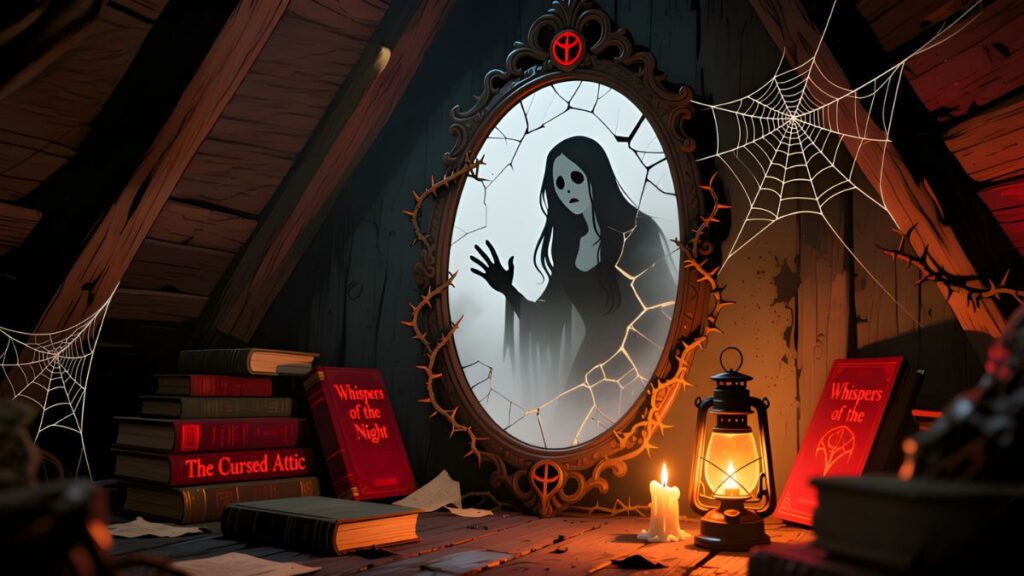
The attic smelled like mothballs and forgotten memories.
Lila pulled open the trapdoor, wincing at the sudden cold that hit her. Dust swirled in the thin shafts of light from the small, grimy window.
“Grandma really hasn’t been up here in years,” she muttered, brushing cobwebs from a trunk.
Boxes were stacked haphazardly, labeled in faded cursive: “Winter Clothes 1976,” “Old Photographs,” “Miscellaneous.”
She worked methodically, pulling out old blankets, a few porcelain dolls, a stack of yellowed newspapers.
Then she saw it.
Leaning against the far wall, half-buried in a pile of tarps, was a tall, ornate mirror. Its frame was carved with twisting vines and tiny faces that seemed almost alive.
Lila knelt beside it.
The glass was clean—too clean.
She expected to see herself, hunched over the floor, sweeping cobwebs.
But she didn’t.
The reflection was wrong.
The attic looked darker, older. Shadows clung to the corners, stretching like fingers. Dust motes hung in the air but moved differently—curling and twisting of their own accord.
Her own reflection stared back, but it wasn’t quite her. The eyes were too wide. The smile too sharp.
Lila jumped back.
“Just my imagination,” she whispered.
She reached out to touch the glass.
The reflection did the same. But its hand lingered an instant too long. Too close.
A chill ran down her spine.
Over the next hour, Lila cleaned around it, thinking the mirror was just an antique, perhaps warped by age.
But the more she looked, the more it changed.
First, the shadows. They twitched, darted, and sometimes formed shapes that weren’t in the room. A tall figure standing just behind her in the reflection, when the attic was empty.
Then her own face. It… shifted. A faint smirk, a blink too slow. Eyes glimmering red for just a heartbeat.
Lila tried not to stare.
But it was impossible.
The mirror drew her in, whispering silently. Pulling her gaze back every time she looked away.
She tried to cover it with an old blanket. It didn’t work.
When she lifted the cloth, the reflection grinned wider.
“Who’s there?” she whispered, voice trembling.
The mirror didn’t answer. But the reflection’s eyes followed her as she moved.
It blinked when she didn’t.
It smiled when she frowned.
Night fell outside. The attic window no longer let in light. The shadows thickened.
Lila sat on the floor, hugging her knees.
And then it spoke.
Not in words. Not aloud.
In thought. Clear, insistent, intimate.
“Stay.”
Lila screamed.
She stumbled back, hitting the old wooden beams.
The mirror’s reflection was gone. The attic looked empty again.
Her heart slowed.
“Just a trick of the light,” she told herself.
The next day, she returned with a flashlight. The attic was bright in the harsh sun.
No shadows moved. No figures lurked.
Yet, something gnawed at her. A memory of red eyes, too wide. Too sharp.
She told her grandmother.
“Oh, that old thing?” her grandmother said. “It’s been in the family for generations. Never take it too seriously. It’s… peculiar.”
“Peculiar?” Lila asked.
Her grandmother shrugged. “Sometimes it shows you things about yourself. Sometimes… it shows you things you wish you hadn’t seen.”
That night, Lila couldn’t sleep. She kept thinking about the mirror. About the reflection.
She crept back to the attic.
This time, she didn’t bring a flashlight. The attic was pitch dark. The window black.
The mirror gleamed faintly in the moonlight that filtered through the slats.
And it was waiting.
Her reflection smiled.
But this time, it moved on its own.
It stepped forward.
Lila froze.
Then it spoke—again, not aloud, but in her mind.
“Come closer.”
She tried to pull away. She wanted to run. But her body moved toward the glass.
Her hand touched the cold surface. The mirror was like water. Soft. Yielding.
She recoiled.
Then the reflection reached through.
Her fingers brushed against hers. Cold. Hollow.
A whisper of something terrible seeped into her thoughts.
“Stay… forever.”
The air grew heavy. Shadows twisted around her feet. The attic seemed to breathe, expanding and contracting.
Lila ran.
She slammed the attic door behind her and locked it.
But the mirror didn’t stay hidden.
In her dreams, she saw it. The reflection in the mirror—smiling, moving independently, closer each night.
She tried to ignore it, but every glance at any reflective surface brought the same horror.
Windows. Bathroom mirrors. The black screen of her phone.
Her own eyes stared back. But they weren’t hers.
Her mother noticed the change.
“You’re not yourself lately,” she said.
“I’m fine,” Lila lied.
But she wasn’t.
The mirror’s pull was stronger each day. Lila found herself standing before it, unable to resist.
She tried to cover it. Tried to destroy it.
Nothing worked. The glass was unbreakable. The frame unmovable.
The reflection mocked her.
It didn’t just show her anymore. It acted. Planned. Waited.
It learned her habits. Her fears. Her weaknesses.
It whispered in her dreams, in her thoughts, in the quiet moments when she was alone.
“Come closer.”
One night, she couldn’t resist.
She reached out.
And the reflection stepped forward.
The last thing she felt was cold, impossibly deep cold.
When she woke, she was lying on the attic floor.
The mirror stood as always. Unmoving. Empty.
Or so it seemed.
Her reflection in the glass was… wrong.
Eyes wider. Smile sharper. Shadows dancing behind her.
Lila realized she wasn’t alone in the attic anymore.
And maybe… she never would be again.
Her reflection had learned to move independently. To wait. To mimic.
To replace.
And the real Lila? She didn’t remember leaving the room. Didn’t remember the shadow in the mirror reaching out for her.
Because the mirror didn’t just reflect her.
It consumed her.
Bit by bit.
Until one day, no one would recognize the real girl anymore.
Only the shadow.
The dark version.
The one that moved on its own.
The one that smiled… always, from inside the mirror.
And the attic? It stayed empty.
But sometimes, if you looked closely through the window at night, you could see a face pressed to the glass. Not the face of the girl who had lived there… but something else.
Something that had learned to wait.
Something that never forgot.
Something that always wanted more.
The Whispering Jack-o’-Lantern
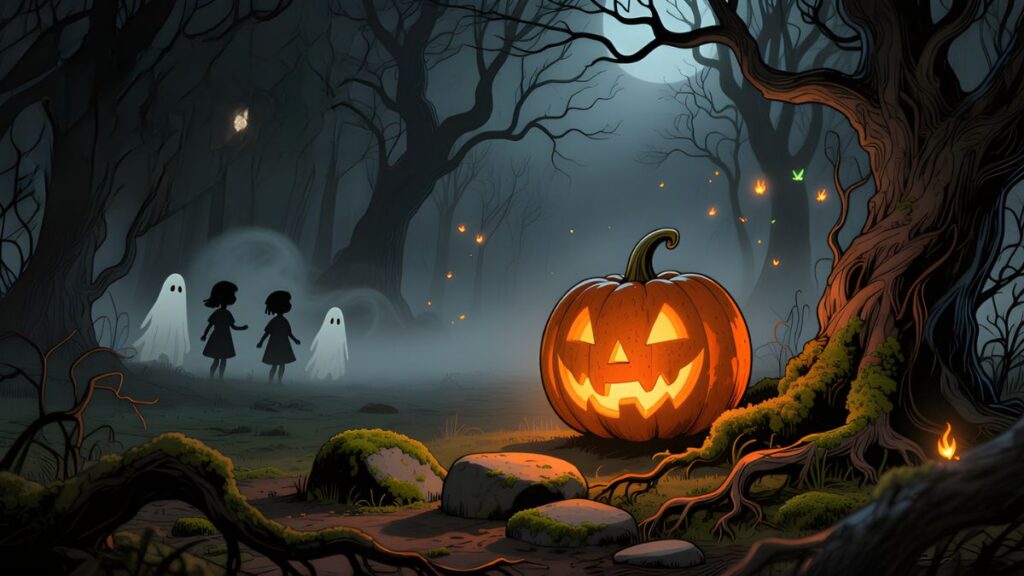
The air smelled of wet leaves and decay.
Halloween had descended on the town with all its chill and mischief.
Tommy Granger trudged down the sidewalk, backpack slung over one shoulder, his pumpkin-shaped bucket bouncing with every step. His friends had already scattered into the night, their laughter trailing behind them like ribbons of sound.
“Last house!” Tommy shouted, pointing at the Simmons place at the end of the street.
The house had been abandoned for years. Windows boarded, shutters crooked, porch sagging. Everyone said it was haunted. Everyone avoided it.
But tonight… there was a pumpkin.
A massive, grotesque pumpkin, carved with jagged teeth and hollow eyes that seemed almost… alive. Its candle flickered despite the wind, casting grotesque shadows across the peeling porch boards.
Tommy approached cautiously, trying to steady his racing heart.
“Trick or treat!” he called.
Nothing.
Then he heard it.
A faint whisper, soft as the rustling leaves.
“Tommy… Tommy Granger…”
He froze.
The voice was unmistakable. His name, drawn out slowly, deliberately.
“Who’s there?” he called, trying to laugh. “Very funny.”
The pumpkin seemed to shift slightly in the dim light. Its jagged mouth seemed wider. Its eyes darker.
“I know what you did,” it whispered.
Tommy swallowed hard.
“What are you talking about?” he asked. His voice trembled.
“I saw you take it,” the pumpkin said. “…The money in your mother’s jar.”
Tommy’s stomach dropped. Last week, he had pocketed a few coins. Just a few. He hadn’t even thought anyone noticed.
“You… you can’t know that,” he said, backing away.
“I know everything,” the pumpkin replied. “I remember. Every lie. Every little secret. Every shameful thing you try to hide.”
Tommy’s laughter died. His pumpkin bucket slipped from his hands and tumbled down the steps. Candies spilled across the porch boards.
The wind carried the whisper closer, curling around him, filling his mind.
“You hid the candy from your sister,” it said. “You cheated on your math test. You lied about who broke the vase.”
Tommy’s hands shook. His knees went weak. He stumbled backward, heart hammering, his backpack falling to the ground.
“This isn’t real! You’re just… just a pumpkin!” he shouted.
The pumpkin’s grin stretched impossibly, shadows writhing across its carved mouth.
“Am I?” it whispered. “Or do I remember everything you wish you could forget?”
Tommy backed down the steps and onto the street. His breath came in short, ragged gasps. He didn’t look back until he reached the corner.
The pumpkin was gone.
No flicker of candlelight. No shadowy grin. Just darkness.
That night, Tommy tried to sleep.
He kept seeing it in the corners of his room. The shadows twisted, forming jagged, toothy smiles. The whisper returned.
“I’m still here.”
He tried to convince himself it was imagination, sugar-induced nightmares, or the wind. But every reflective surface betrayed him. The mirrors, the polished windows, even the black screen of his phone showed eyes that weren’t his own.
Eyes that watched.
Eyes that remembered.
Days passed.
Tommy avoided the Simmons place, tried not to think of the pumpkin. But he could feel it everywhere—lurking, waiting, observing.
At school, in the cafeteria, the whispers were louder. Clearer.
“Who did you really hit today?” it asked.
“Who do you lie to every day?”
“Do you remember Megan’s secret?”
Tommy couldn’t answer. He wanted to run, but the whispers followed him even in his thoughts.
He told his parents.
“There’s a pumpkin on the Simmons porch,” he said. “It talks to me. It… it knows things.”
His parents laughed nervously.
“You ate too much candy,” his mother said. “It’s probably just your imagination.”
His friends didn’t believe him either. They laughed, called him silly, told him to grow up.
But the pumpkin never forgot.
Weeks later, Tommy passed the Simmons place again.
The pumpkin had returned. Candlelight flickering. Jagged grin wider than before.
“Hello, Tommy,” it whispered.
Tommy ran. Heart pounding. Head spinning.
But the pumpkin wasn’t just on the porch anymore. It followed him. In shadows. Reflections. Windows. Mirrors. Every quiet moment, whispering secrets it shouldn’t know.
“Do you remember what you said about Megan?”
“Who did you lie to today?”
“Who do you think saw you?”
Tommy’s life became a nightmare. His grades fell. He stopped sleeping. He stopped talking.
He could see the pumpkin’s grin in every dark corner. He could hear its whispers inside his head.
He tried to ignore it.
He tried to destroy it. Smashing the pumpkin against the porch steps, dousing it with water. It reappeared every time. Candle glowing, grin jagged, whispers creeping inside him.
The pumpkin didn’t just know his secrets—it reminded him. Every night. Every thought. Every fleeting guilt. Every moment of shame.
It had memory. Patience. Power.
One night, desperate, Tommy returned to the Simmons porch.
“I’m sorry!” he shouted. “I’ll be good! I promise!”
The candle flickered. For a brief moment, silence.
Then whispers filled his head. Not the porch, not the street.
Inside him.
“I remember everything,” it said.
“And I will never forget.”
Years passed. Tommy avoided pumpkins entirely. Halloween terrified him. He told himself the whispers were a hallucination.
But deep down, he knew.
Some secrets are never safe.
Some things remember everything.
Some things never forgive.
And every Halloween, when the wind rustled through the wet leaves, Tommy could hear it:
“I know you.”
He could see it in every shadow. Every reflection. Every faint flicker of light.
The Jack-o’-Lantern never forgets.
It never forgives.
And it always waits.
For the next secret.
For the next sin.
For the next victim.
And Tommy? He would never truly be alone again.
Midnight Bus
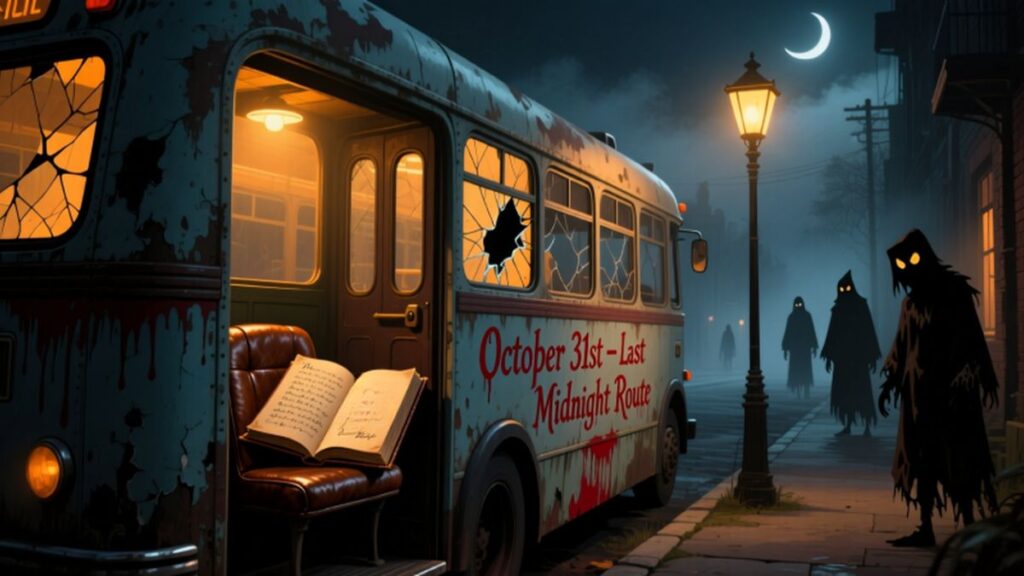
The fog hung low over the empty streets.
It was past midnight, and most of the town had gone quiet.
Jim Hargrove, the night bus driver, adjusted his rearview mirror and yawned.
“Another slow night,” he muttered to himself.
He drove past the usual deserted roads, the orange glow of streetlamps flickering against the mist.
Then he saw them.
A cluster of kids at the edge of the old Elmwood neighborhood.
They wore costumes—ghosts, witches, superheroes. Their laughter was faint but carried on the damp air.
Jim slowed the bus and stopped.
“Where are you kids headed?” he asked through the window.
“Anywhere!” one of them said, a little girl in a sparkling princess dress. Her smile was wide, almost too bright.
“Hop on,” Jim said, motioning to the door.
They climbed aboard, chattering excitedly.
Jim started the engine again.
He checked the route schedule. No stops scheduled for this hour. But it didn’t matter. Kids were kids. He’d drive them anywhere.
The bus moved through empty streets. Fog wrapped around the headlights, swallowing the roads ahead.
“Where are your parents?” Jim asked.
The kids laughed.
“Parents? We don’t need them,” said a boy in a skeleton mask.
Jim frowned but said nothing.
The bus rumbled through the town, then into the outskirts. Trees lined the sides of the road like silent sentinels.
The kids whispered, leaning close to one another, their eyes darting to the windows.
Then one by one… they vanished.
First, the skeleton boy. One moment he was there, mask crooked on his face. The next, gone.
Jim slammed on the brakes.
“Where did he go?” he shouted.
The others looked at him, eyes wide. No words. No movement.
He turned to check the rearview mirror. Empty seats.
Heart hammering, Jim stopped the bus in the middle of the foggy road.
“Kids? Where are you?”
Nothing.
The bus was empty.
He fumbled with the radio, trying to call the station.
“Jim? Everything okay?” the dispatcher asked.
“There… there were kids. I picked them up. They’re… gone!”
The dispatcher laughed nervously. “Jim, it’s midnight. The schools are closed. There shouldn’t be any kids out there. You must’ve been dreaming.”
Jim didn’t respond.
He stepped outside. Fog wrapped around him like a wet blanket. He called their names. Nothing answered but the echo of his own voice.
Shivers ran down his spine.
He returned to the bus. The doors were shut, the seats empty. No evidence they had ever been there.
But he swore he heard whispering.
A soft, unintelligible murmur that rose and fell with the fog outside.
The next morning, Jim drove to the school to check the records.
“Any kids out after hours last night?” he asked the secretary.
She blinked. “No, Jim. The last student left hours ago. The building was empty by seven. There was nobody there past midnight.”
Jim’s hands trembled.
“I… I picked them up,” he said, voice cracking. “I swear!”
“No students. Not a one,” the secretary said firmly. “You must have been mistaken.”
He drove home, mind racing. The fog lingered even in the early morning.
That night, he kept checking the rearview mirror, heart pounding at every shadow.
The next week, the same thing happened.
Same fog. Same hour.
A group of kids appeared at the roadside, costumes damp with mist.
Jim stopped. He didn’t even ask where they were going this time.
The moment they boarded… he noticed.
Their eyes were empty. Faces pale, lips stiff.
Then, as before, they vanished one by one.
Empty seats. Silent bus. Fog outside thick as wool.
And whispering.
Always whispering.
No one believed him. Dispatcher laughed it off. Police said it was just tired imagination.
But Jim knew.
The kids weren’t living.
They were… something else.
Something tied to the midnight fog.
Something that only appeared when the streets were empty, the town asleep.
He refused to drive the route again.
But the bus found its way onto the roads anyway.
At night, parked outside the depot, Jim would sometimes hear the low rumble of the engine starting on its own.
And the whispering.
Calling. Waiting.
Then one night, curiosity—or madness—pushed him back behind the wheel.
The fog rolled in, dense as velvet.
Kids appeared at the roadside, costumes tattered, eyes glimmering with a strange light.
They climbed aboard silently this time.
Jim’s stomach twisted. He tried to turn back, but the bus moved forward.
The whispers grew louder. They spoke in voices he had never heard before. Names he didn’t recognize. Secrets he had never told anyone.
The bus followed a road that didn’t exist on any map. Trees twisted unnaturally. Shadows loomed larger than reality.
Then they vanished.
The seats were empty. The mirrors reflected nothing but fog.
Jim tried to stop the bus. Brakes locked. Engine died. But the bus rolled forward anyway, propelled by some unseen force.
A whisper right next to his ear:
“Drive us.”
The road stretched endlessly. Fog pressing in.
The bus carried him into the night, past streets he didn’t know.
And every so often, a child would appear in the corner of the rearview mirror, pale and silent.
Then gone.
Jim’s screams echoed into the fog, swallowed instantly.
No one found the bus. No records showed it on the roads.
The next day, the town was quiet.
The depot was empty.
But some nights, when the fog rolls in, the rumble of a bus engine can be heard in the distance.
And if you stand too close to the roadside… you might see pale, costumed children waiting silently.
Waiting for the midnight bus.
And the driver? He never stops.
The House That Hunted
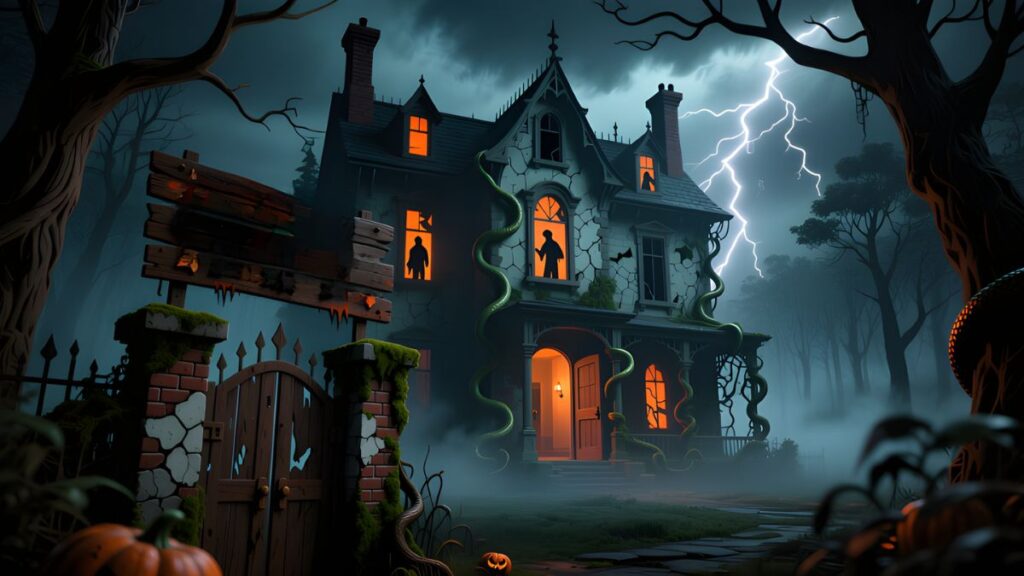
Everyone in town knew the rumors.
The old Cartwright house at the edge of Millstone Lane wasn’t for sale anymore. No one had lived there for decades. Paint peeled in jagged strips. Windows were blackened with dirt and smoke stains. The porch sagged as though it were tired of holding itself up.
And every year, one person… disappeared inside.
Doors slammed. Lights flickered. Objects moved. Shadows danced where none should be.
Some said the house chose its victim.
Some said it held grudges.
All said the same thing: don’t go in.
Seventeen-year-old Alex Parker didn’t believe in ghost stories.
“Haunted house, my butt,” he said to his best friend, Mia, as they stood across the street one October evening.
“You seriously want to go in?” Mia asked, biting her lip.
“Of course. Someone has to prove it’s all nonsense.”
They waited until dusk, when the last streetlamp flickered on, then crossed the empty street.
The door to the Cartwright house groaned when Alex pushed it open.
Inside, the air was thick and cold. Dust motes hung like tiny specks of stars in the dim light. The floorboards moaned under their weight.
“See?” Alex said. “Nothing to be scared of.”
But the minute he stepped further inside, a door slammed somewhere behind them.
“Okay… maybe a little creepy,” Alex admitted, trying to laugh.
The lights flickered. Not the bulbs—some strange, uneven pulse, like the house was breathing.
Objects shifted subtly. A chair slid a few inches. A vase teetered.
Mia grabbed his arm. “We should go.”
Alex shook his head. “One night. That’s it. Nothing bad can happen in one night.”
The house seemed to chuckle in response.
They explored the living room. Old portraits lined the walls, faces somber, eyes hollow. They didn’t just look at Alex and Mia—they followed them.
Alex shrugged. “Just old paintings.”
But the air grew heavier.
Whispers seemed to curl around their ears. Just low enough to be unsettling, but impossible to understand.
A door upstairs creaked open on its own.
Alex, curious despite the tension, began to climb the stairs.
Mia followed reluctantly.
Upstairs, the hall stretched endlessly. Or so it seemed. The floor shifted slightly underfoot, elongating. The door at the end of the hall pulsed as if breathing.
A photograph lay on the floor. A teen. His hair messy. Eyes wide with fear. Alex picked it up.
“Who is this?” he asked.
Mia shook her head. “I don’t know. It feels… wrong.”
Suddenly, the door slammed shut behind them. Light flickered overhead. Shadows stretched across the walls, elongating, twisting.
Alex’s heart raced. “Okay… maybe this is a bad idea.”
But the house had begun to move.
Objects flew across the hallway. A chair spun on its own. A picture frame slammed into the wall.
“I said bad idea!” Mia screamed, pulling on his arm.
But the hallway had changed. Doors that had been closed were now open. Rooms stretched, corridors twisted. It was as if the house were alive, reshaping itself around them.
Alex felt a presence. Something old. Something angry.
A whisper, this time clear:
“You remember me?”
“What?” Alex stammered.
The air thickened. A cold hand brushed against his shoulder. He spun around. Nothing.
Another whisper:
“You wronged me.”
Mia grabbed him. “We didn’t—”
The house wasn’t listening.
Lights flickered violently. Shadows reached out, clawing across the walls, across the floor.
Alex noticed scratches on the walls, faded, old. Names. Dates. Faces scratched into wood.
It remembered.
It remembered everyone who had ever dared enter. Every slight, every insult, every forgotten debt.
And now it remembered Alex.
A door slammed in the living room. A gust of cold wind rushed past. Objects hurled themselves across the room.
Alex and Mia ran down the hall, but the house shifted underfoot. Staircases stretched. Doors disappeared, then reappeared behind them.
“You think you’re brave,” the whispers hissed. “But bravery is nothing to me.”
Alex’s flashlight flickered. Shadows twisted into grotesque forms. Faces of past victims, pale and accusing, stared from the walls.
Mia screamed. “We have to leave! Now!”
But the door to the outside was gone. Replaced by a wall of rotting wood.
They were trapped.
And the house… it remembered Alex’s every doubt, every fear. It pressed on them like a living thing.
In the parlor, they found a chair. It tilted upright on its own. A portrait fell, revealing a small cavity behind it. Inside, a diary.
Alex opened it.
It belonged to the first teen who had spent the night decades ago.
Every page described the house’s will, its memory. How it punished those who dared enter, those who ignored its past. How it waited for the next visitor.
And then the last entry:
“It knows my name. It knows my sins. And now it will claim me.”
The lights went out. Only the flicker of a single candle remained.
Alex and Mia huddled together. The floorboards creaked beneath them. Shadows danced across the walls.
“You can’t leave,” the house whispered. “Not tonight. Not ever.”
A hand, cold as marble, grabbed Alex’s ankle. He yelped.
Mia tried to pull him free, but the hand vanished as if swallowed by the floor.
The walls seemed to pulse, alive with memory. Old grudges, old hatred, old anger. The house kept them all, feeding on fear.
Alex realized something horrifying. The house didn’t just punish intruders. It kept them. It fed on them. Learned from them. Remembered them.
They ran. Each room twisted into new shapes, the house anticipating every step.
Finally, they reached a door. Faded, splintered. The knob was icy cold.
Alex threw it open. Light from the street poured in.
They ran into the night, never looking back.
The house stood silent. Watching. Waiting.
And inside, the shadows moved.
A whisper lingered:
“You cannot escape. I remember.”
Years later, Alex never spoke of the night again. But the memory haunted him. He avoided empty houses, avoided basements, avoided any place that felt… alive.
Some nights, he swore he could hear the floorboards creak under invisible feet.
And in his dreams, the house waited.
Every year, it chose a new victim.
And it remembered them all.
Old grudges never die.
Candles in the Fog
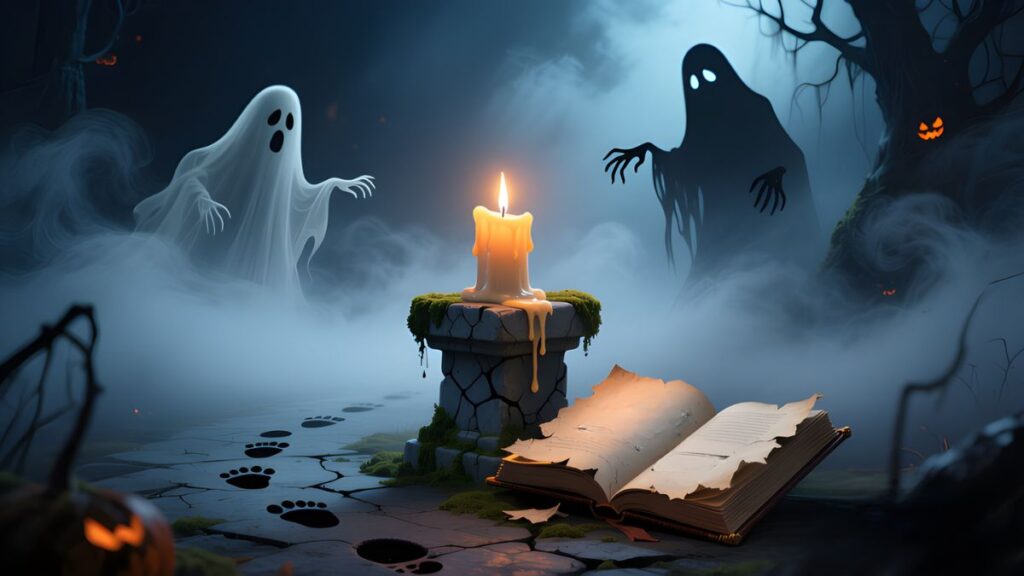
The fog rolled in early that Halloween night.
It lay thick across the woods at the edge of town, turning trees into shadowy figures and the path into a ribbon of nothingness.
A group of kids huddled at the treeline, their flashlights weak against the mist.
“Do you see them?” whispered Emma.
Flickers of candlelight danced among the trees. Small, golden flames bobbed gently, like fireflies—but too steady. Too deliberate.
“They’re… leading somewhere,” said Jake, his voice tight with excitement and fear.
Emma hesitated. “Maybe we shouldn’t—”
But curiosity was stronger than caution.
The first candle flickered in the fog and vanished, only for another to appear further along the path.
One by one, they followed.
Step after step. Footfalls muffled by the thick, damp undergrowth. Mist curling around their ankles.
It was easy. Too easy.
“Where do you think they go?” whispered Maya.
“No idea,” Jake said. “But we’ll be the first kids to find out.”
The woods seemed endless. The fog swallowed familiar landmarks. Each candle appeared slightly ahead, always just far enough to lure them onward.
Branches scraped against their arms, leaves clinging wet and cold to their jackets. But the candlelight never faltered.
“Look!” Emma pointed. Another candle appeared ahead, floating just above the forest floor.
They ran toward it, hearts pounding.
The deeper they went, the colder the fog became. It pressed against their faces, thickening, clinging to their clothes, filling their mouths.
And then the whispers began.
Soft. Just barely audible.
“Come closer…”
“Follow…”
The kids froze.
“Probably just the wind,” Jake said, trying to sound brave.
But the whispers became clearer. Voices, hissing and urgent. Speaking words they didn’t understand. Or maybe… words they didn’t want to.
Emma shivered. “I don’t like this. We should go back.”
But the path had disappeared. The candles flickered ahead, but the way behind them was gone.
The fog thickened, almost solid. Their footsteps sank into unseen roots. Branches tangled their arms. Every direction looked the same.
“You brought us here,” a voice whispered, low and dark.
The kids spun. Nothing. Only fog and candles.
“Who’s there?” Jake shouted.
Silence.
Then movement.
Shadows twisting through the fog, slower than wind, heavier than mist. Something waited just beyond the candles’ light.
“Keep moving!” Jake yelled.
But each step forward felt harder. The fog clung tighter. The shadows pressed closer.
One candle flared suddenly. Emma saw a shape.
Tall. Thin. Covered in shadow. No face. Just eyes—bright, cold, glowing—watching.
She gasped. The shape vanished when she blinked.
“They’re watching us,” she whispered.
Jake tried to grab her hand, but the fog shifted. They were separated. Alone.
“Emma!” Maya called.
No answer. Only whispers.
The candles led them deeper. The path was endless. Every turn brought new shadows, new whispers, new fear.
Emma stumbled, tripping over roots that weren’t there moments before. She fell into the fog, and the candlelight flickered out.
Darkness surrounded her.
She could hear it breathing. Something massive, slow, patient. Waiting.
A voice hissed inside her head.
“Stay…”
She ran blindly. Branches tore at her jacket. Roots snagged her shoes. The fog churned, thick and cold.
Somehow, she found another candle. It flickered weakly, a distant flame.
She ran toward it.
Behind her, whispers echoed. Names she didn’t know. Secrets she had never told. Screams that weren’t hers.
The candle led her to a small clearing. More candles appeared, forming a circle. Shadows danced inside the light, flickering unnaturally.
And in the center…
Something waited.
A shape taller than any man, limbs twisted, face impossible to focus on. Eyes glowing like coal. It didn’t move toward her—it didn’t need to. Its presence was enough.
Emma froze.
The shadows stretched outward, reaching toward her. The fog wrapped her like a living thing.
The candle flames began to flicker wildly, then went out. Darkness swallowed the clearing.
Emma screamed.
Then… silence.
The fog lifted just enough for her to stumble back onto the path. She ran blindly, branches tearing her clothes.
Behind her, the whispers followed. Soft, patient, never-ending.
When she reached the edge of the woods, the fog thinned. Morning light spilled over the town.
But the experience lingered.
Her friends were gone.
Vanished. No trace. No footprints in the soft, wet ground. Only she remained.
Emma tried to tell the others. Adults, police, her parents.
“No kids are missing,” they said. “You must have wandered off in the fog.”
But she knew the truth.
The candles would appear again next Halloween.
The path would form. The whispers would call.
And something waited.
Always waiting.
Some nights, when the fog rolls in over the woods, Emma swears she can see the faint flicker of candlelight.
She can hear the whispers.
And she knows…
Those who follow too closely never leave.
They’re part of the fog now.
Part of what waits where the shadows are thickest.
And every year, the candles appear again.
Calling. Luring. Waiting.
For the curious.
For the brave.
For the foolish.
The Costume That Knew You
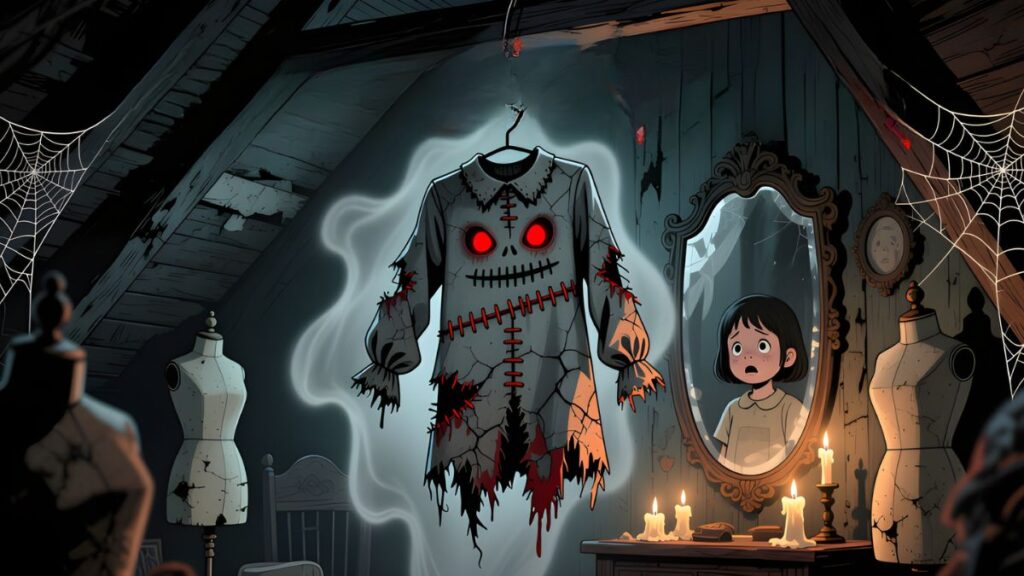
It was the last week before Halloween.
Jared wandered the thrift store, aimless, searching for something cheap and memorable.
Among the racks of faded jackets and moth-eaten dresses, he spotted it.
A vintage costume. Dark velvet, embroidered with intricate patterns. A mask with a permanently painted smile.
He held it up, examining it under the flickering fluorescent lights.
It was perfect.
Too perfect.
He slipped into the costume in the store’s tiny changing room.
It fit like a second skin.
He looked in the cracked mirror. The mask reflected his own face—yet not quite. The smile was sharper. The eyes… older.
“Whoa,” he whispered.
He bought it.
That night, he tried it on at home. Alone in his room.
At first, nothing seemed strange.
Then… the hands.
His hands moved differently. Finer. More deliberate. Unfamiliar gestures that weren’t his own.
“What the—” he muttered.
The mask felt warm, alive. It was like it had its own memory, its own intent.
Jared shrugged. “It’s just a costume. Halloween hype.”
But the next day, he noticed something.
He walked down the street, minding his own business, when his feet turned without instruction.
Down alleys. Into corners he didn’t recognize.
The costume guided him.
It wasn’t cruel yet. Just… insistent. Pulling him toward something he didn’t understand.
That night, he dreamed.
A figure in the same costume, decades older. Eyes hollow, hands bloodied. Whispering.
Finish it.
He woke drenched in sweat.
The costume fit tighter than before, clinging to his skin. The mask’s smile seemed sharper. Watching. Waiting.
He tried to remove it.
It resisted. Fabric clung. Threads tightened. He tore it off, shaking.
But when he looked at it later, folded on his bed, it seemed… different. Expectant. Patient.
Jared didn’t sleep. Not well.
The next day, he found himself wandering the old theater district.
It wasn’t conscious thought guiding him. The costume did.
Through alleys, across streets, past boarded-up doors.
It stopped in front of a crumbling theater. The marquee read: The Last Performance—1927.
Jared’s heart thudded. He didn’t remember choosing this place.
The costume did.
Inside, dust and decay. Curtains moth-eaten, stage cracked. A faint smell of old blood and perfume lingered.
He walked to the center of the stage. Masked eyes scanning. Costume guiding.
Then he saw them.
Ghostly figures. Actors from long ago. Costumes torn, faces pale. All staring. Waiting.
One approached. Hand extended.
“Finish it,” it said. Voice cold and hollow.
Jared’s own hands lifted, guided by the costume. He obeyed. Movements not his own. Gestures precise, deadly, like he had been trained before.
On the stage, an invisible scene played out. The air vibrated with unfinished lines. Old rivalries, betrayals, promises unkept.
He acted. Each step, each movement dictated. The costume’s past merged with his present.
And then he realized…
This costume hadn’t been made for him.
It had been waiting.
Waiting for someone alive to carry on its unfinished business.
The figures moved closer, ghostly rehearsals of grudges long dead.
Jared’s hands obeyed. His feet moved. He played the role flawlessly, even though he had no memory of the story.
The mask smiled wider, sharper.
He couldn’t stop.
Days blurred. He wore the costume constantly. School, home, the streets. The costume guided. Whispered. Remembered. Watched.
Friends noticed. Concerned.
“Jared, what’s wrong with you?”
He shrugged, unable to answer. Not consciously.
The costume’s influence grew. Commands more subtle. Gestures. Words. Actions. Every movement he thought was his own… wasn’t.
One night, he followed it to the abandoned theater again.
The ghosts waited.
The last scene unfinished.
The mask tightened on his face. The velvet pulled him forward.
“Finish it,” the voice demanded.
He moved. Rehearsed movements centuries old. Lines never spoken. Gestures of vengeance, betrayal, sorrow.
The costume had a memory. A will. A grudge.
And he was its instrument.
Hours passed, or minutes. Time no longer mattered.
By dawn, the theater was still. The ghosts faded. The costume relaxed, but only slightly.
Jared was exhausted.
He tried to remove it. Again.
Impossible.
The mask clung, smiling. Alive. Waiting. Patient.
He realized… the costume would never let him go.
It had unfinished business.
And now, so did he.
Years later, Jared never removed the costume. It was his second skin, guiding his life.
Jobs. Relationships. Decisions. Every step influenced. Every action dictated.
And every Halloween, the costume demanded more.
It whispered of debts unpaid. Promises broken. Scenes unfinished.
He acted. Always.
The costume remembered everything. It never forgot.
And it always waited.
For the next performance.
For the next victim.
For the next life to guide.
Because some costumes aren’t just worn.
They possess.
They choose.
And the one who wears it… becomes part of its story.
What Makes a Halloween Story Stick
Okay, so not every creepy tale will haunt you. Some are just meh. You’ve probably skimmed through one, nodded politely, and set it down, feeling nothing. Why? It’s all in the bones of the story.
Characters that matter
If I don’t care about the people in the story, I’m not scared. Simple as that. You need someone to root for—or at least someone whose demise rattles your imagination.
Setting the scene
A dark forest is just a dark forest until the author makes you smell the damp leaves, hear the rustle of small creatures, and feel that sudden chill that crawls down your neck.
Pacing
Too fast? You’re lost. Too slow? You’re bored. The art is in the build-up, that heartbeat pause before the scream, the moment you know something’s off but can’t put your finger on it.
The unknown
Humans fear what they can’t see. The story doesn’t need a monster on every page. Sometimes, just a shadow, a whisper, a sudden emptiness is enough to make you sweat.
And the best stories? They make you see your own world differently. That crack in the hallway light? Suddenly sinister. That neighbor’s rustling tree? Could be alive.
Reading Alone vs. Reading With Others
I’ve done both. Alone, the suspense is internalized. Every shadow, every sound feels amplified. Your heart races. You might pause mid-sentence, glance over your shoulder, even call your dog (or roommate) just to confirm the world is still real.
Reading with others? A different vibe entirely. You get gasps, nervous laughter, whispered commentary. It’s social. Stories become shared experience. And sometimes, the best horror isn’t on the page—it’s watching your friend scream at a “jump scare” you just read aloud.
And honestly, there’s something magical about reading aloud. My cousin and I used to take turns narrating tales during sleepovers. One of us would stumble over words, laugh, or whisper so softly the other had to strain to hear—and the tension was insane. Couldn’t do that alone.
The Power of Atmosphere
Look, story quality matters. But even the best story falls flat if the atmosphere isn’t right. Lighting, timing, weather, all of it. A drizzly October evening beats a sunny afternoon every time. Flickering lights, autumn leaves rustling, faint sounds from the street—it all adds to the effect.
I remember one year, I read a story about a ghostly figure that appeared only at midnight. I timed it. Lights dimmed. Rain pattered. My cat bolted under the bed at the exact right moment in the story. It was…perfect chaos. I can still feel that tingle now, years later.
So don’t underestimate atmosphere. A story in isolation is fine, but paired with mood? It’s legendary.
Why Rereading Works
You might scoff, but rereading is underrated. The first read is about suspense. You’re clutching the page, not wanting to blink. The second? You catch details, foreshadowing, subtle word choices, and a sense of narrative craft you missed. And somehow, even knowing what’s coming doesn’t kill the thrill. Sometimes, it enhances it.
And rereading builds your “spooky literacy.” You start to notice the tricks authors use, the patterns in pacing, the way tension ebbs and flows. You learn what makes your own imagination tick. You get better at picking the stories that will actually stick.
Digital vs Physical Books
I won’t lie. Kindle is convenient. You can adjust the light, carry ten stories at once, and sneak a chapter under the blankets without waking anyone. But physical books? They have a vibe. A scent. The weight. The sound of a page turning. And yes, the ability to hide behind a cover when it gets too scary.
I used to stack old paperbacks around me, almost like a protective fortress, when reading Scary Stories to Tell in the Dark. It worked…sort of. The shadows moved differently, the rustle of the pages somehow mingled with the imagined creaks in my attic, and I was hooked.
Sharing and Traditions
Halloween stories aren’t just about reading. They’re about sharing. Passing tales down through generations. Even if you don’t write, you can retell. Add flourishes. Change endings. Make them your own.
At my neighborhood’s annual Halloween walk, we’d each pick a story. Kids of all ages crowded around, their candy-sticky fingers clutching pages. Someone would start reading, others acted it out. Pure magic. And yes, every year, one story got everyone screaming and laughing at the same time. Those stories stayed with us far longer than any candy ever did.
Why Stories Persist
Think about it. We’ve been telling tales of spirits, monsters, and the unknown for millennia. From Celtic myths to American campfire stories, humans crave these narratives. They teach. They thrill. They bond. They help us face fears safely.
Halloween? It’s the perfect excuse to indulge in that primal craving. You get chills, excitement, nostalgia, and connection all at once. And unlike movies, a good story gives your imagination room to work. The monster is as big, as terrifying, as sneaky as your mind allows. You are part of the tale.
Final Thoughts
So, what’s the takeaway? Pick your stories carefully. Set the mood. Read with intent. Share when you can. Don’t just skim the surface—immerse yourself. Let your pulse race, let your imagination wander, let your memories of past Halloweens enrich the experience.
And yes, sometimes you’ll scream. Sometimes you’ll laugh. Sometimes you’ll pause and just breathe, knowing the story is over but feeling the echo linger. That’s the point. That’s why we read Halloween stories.
It’s more than entertainment. It’s ritual, thrill, nostalgia, and growth all rolled into one.
So go on. Pick that book. Dim the lights. Grab your favorite blanket. And dive in. You’ll never see Halloween the same way again.


